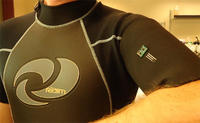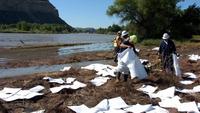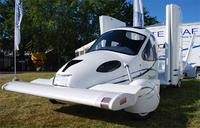-
Combating counterfeit microchips // by Dr. James Hayward, Ph.D, Sc.D.
Dr. James Hayward, the chairman, president, and CEO of Applied DNA Sciences, argues that the U.S. government needs to do more to prevent corrupted microchips from entering U.S. computers that make it easier for hackers and foreign governments to infiltrate networks
-
-
Sensors printed on wetsuits detect explosives, other hazards

UC Sand Diego researcher has successfully printed thick-film electrochemical sensors directly on flexible wetsuit material, paving the way for nano devices to detect underwater explosives or ocean contamination; UCSD has a full U.S. patent pending on the technology, and has begun talks on licensing the system to a Fortune 500 company
-
-
Critical vulnerability found in Apple iPhones and iPads
Apple is scrambling to develop a fix for a software vulnerability that leaves its iPhone, iPad, and iPod Touch devices susceptible to hackers; according to Germany’s Federal Office for Information Security, which discovered the critical software vulnerability, hackers can steal confidential data from the devices without the user even suspecting it by exploiting a flaw in the program that allows users to “jail-break” their devices and run non-Apple software
-
-
World's first cardboard vacuum cleaner unveiled

A U.K. vacuum cleaner manufacturer will market a high performance vacuum cleaner constructed out of recycled and recyclable materials; the device was designed by an industrial design student; the corrugated cardboard panels that form the body of the machine are easily replaced if damaged and cost just a tenth of the price of an equivalent plastic panel
-
-
New technology increase potency of beam weapons

Laser scientists and engineers have long recognized that direct-diode lasers can offer significant advantages over other laser technologies due to their efficiency, reliability, compactness, and relatively low cost; applications for direct-diode lasers have been limited, however, owing to their low brightness — a combination of lower power and poorer beam quality relative to alternative laser technologies; a Massachusetts-based company, using wavelength beam combining (WBC) technology, is offering a way to solve this problem — allowing direct-diode lasers to be used in demanding industrial applications — and in effective beam weapons
-
-
IBM helps Sensus secure the smart grid
In a move that could help bolster U.S. smart grids against cyberattacks, Sensus recently announced that it will incorporate IBM’s encryption and key management technologies into its smart grids; the company will use IBM’s cyber security solutions in its FlexNet communications system for electric, gas, and water utility smart grid endpoints including meters and automated distribution devices
-
-
U.K. awards 160 million Pound nuclear decommissioning contracts

The decommissioning of one of U.K. oldest nuclear plants — Sellafield, located close to the village of Seascale on the coast of the Irish Sea in Cumbria, England — has taken a giant step forward thanks to the awarding of three waste retrieval contracts worth more than 160 million Pounds
-
-
Montana floods exacerbate Exxon oil spill

Flooding in Montana has exacerbated the effects of an oil spill and made clean up more difficult for Exxon Mobil; it is estimated that roughly 750 top 1,000 barrels of crude oil have leaked into the Yellowstone River near Billings, Montana; the pipeline has been shut down, but flooding in the area has made it difficult for clean-up crews to find the source of the leak
-
-
A first: Flying car cleared for road

The U.S. Department of Transportation gave Massachusetts-based Terrafugia two important exemptions which would allow the company to offer its flying car — the Transition — to customers next year; the exemptions allow the company to use different tires and different laminated protective glass, and come on top of a 110 lb. allowance the FAA gave the company last year; these allowance and exemptions mean the flying car will not be treated as plane by the FAA, and those who fly it will not have to obtain a pilot license
-
-
Trapped couple receives bill for stay in New Zealand hotel during quake
A couple stuck in a Christchurch, New Zealand hotel after the 22 February 6.3 magnitude earthquake struck the city, was shocked to discover they had been charged for their stay; a New Zealand man and his wife were trapped on the hotel’s twenty-second floor for hours and eventually were forced to escape after daringly crossing collapsed stair cases, smashing down doors, and crawling to the roof of a parking lot nearby
-
-
Stopping terrorists from using fake IDs at airports

Steve Williams, the CEO of Intellicheck Mobilisa, a technology company that develops wireless identity systems, was recently interviewed by Homeland Security NewsWire’s executive editor Eugene Chow; Williams discusses the ease with which criminals and terrorists use false documents to travel, how pervasive the problem is, and solutions to help stop it
-
-
Apple latest victim of Anonymous cyberattacks
Apple appears to be the latest victim of the mysterious group of international hackers known as Anonymous; the data breach appears to be relatively minor as the hackers only infiltrated a survey used to process technical support follow-up surveys and obtained twenty-seven internal Apple user names and passwords
-
-
Cook County, Illinois cancels troubled security camera program
Contrary to the latest trends, Cook County, Illinois is scrapping a project to equip police departments with real time streaming cameras; Cook County canceled Project Shield, a $44 million federally funded initiative to provide 128 local police departments with cameras in squad cars and stationary locations that streamed live video to central command centers; the program has been plagued by technical problems, cost overruns, and shoddy performance
-
-
New Android facial biometric app available
A new app for Android smartphones allows users to secure their phones using facial biometrics; the Visidon Applock application, which is currently available for free, locks a user’s apps until their identity is verified using facial biometrics
-
-
New airport scanner can detect liquid explosives
Passengers boarding airplanes could soon be walking through security checkpoints carrying liquids once more thanks to a high tech scanner capable of detecting liquid explosives; the device, developed by U.K. based Kromek, is capable of identifying dangerous liquids within seconds and does not require the container to be opened
-
- All
- Regional
- Water
- Biometrics
- Borders/Immig
- Business
- Cybersecurity
- Detection
- Disasters
- Government
- Infrastructure
- International
- Public health
- Public Safety
- Communication interoperabillity
- Emergency services
- Emergency medical services
- Fire
- First response
- IEDs
- Law Enforcement
- Law Enforcement Technology
- Military technology
- Nonlethal weapons
- Nuclear weapons
- Personal protection equipment
- Police
- Notification /alert systems
- Situational awareness
- Weapons systems
- Sci-Tech
- Sector Reports
- Surveillance
- Transportation
Advertising & Marketing: advertise@newswirepubs.com
Editorial: editor@newswirepubs.com
General: info@newswirepubs.com
2010-2011 © News Wire Publications, LLC News Wire Publications, LLC
220 Old Country Road | Suite 200 | Mineola | New York | 11501
Permissions and Policies
Editorial: editor@newswirepubs.com
General: info@newswirepubs.com
2010-2011 © News Wire Publications, LLC News Wire Publications, LLC
220 Old Country Road | Suite 200 | Mineola | New York | 11501
Permissions and Policies
